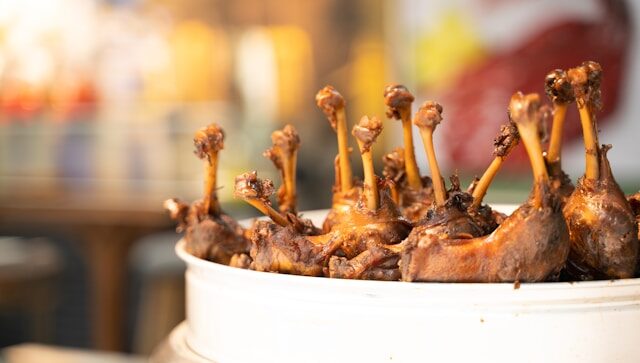A Sunday dinner transforms into an unsettling ritual of indulgence with crispy duck and dauphinoise
Sunday evenings often carry a weight few speak about—a slow, creeping quiet that blankets the city just before the week’s relentless grind resumes. For many, it’s a sacred pause, a fragile bubble of calm and connection. Hannah Twiggs captures this elusive peace perfectly in her new series, Sunday Club, which honours the ritual of cooking something special for yourself or a loved one on the last night before Monday strikes.
This week, Twiggs invites us to indulge in what might appear to be an innocent pleasure: crispy duck legs paired with dauphinoise potatoes and pickled cherries. Yet beneath the surface lies a ritualistic surrender to decadence, a quiet theatre of food that commands patience and promises reward.
Duck has long held a reputation as a dish reserved for restaurants—an extravagant treat that feels out of reach for a humble home kitchen. But Twiggs reveals the simplicity beneath the show. With slow roasting at a gentle 150°C, patience melts the fat away, leaving golden, crackling skin and tender meat falling off the bone. The process demands time but no special mastery, transforming an everyday evening into something quietly extraordinary.
The pickled cherries cut through the richness of the duck with a sharp acidity, infused with a hint of star anise and a dash of pink peppercorns. This tart contrast lends a surprising bite to the plate—a reminder that indulgence often lives side by side with restraint. The seasonal fruit is glossy and sticky, suspended in vinegar and sugar, its sharpness a precise counterpoint to the duck’s lavish fat.
Embed from Getty ImagesAnd then there’s the dauphinoise. Layers of thinly sliced, waxy potatoes bathed in cream, garlic, and Parmesan bake to a golden, bubbling finish. It’s buttery, soft-centred warmth offers comfort without apology, a delicious foil to the crisp duck skin and the sour cherries. This classic French side is not merely an accompaniment but a decadent declaration that this meal is a ceremony, a sanctuary.
Twiggs’ Sunday Club series is more than recipes; it is a manifesto for slowing down, a call to carve out moments of intimacy amid noisy, exhausting lives spent thinking about food rather than truly sharing it. Shopping, prepping, lighting candles, choosing records — these rituals frame the meal, turning cooking into an act of love and presence.
This plate is generous but never fussy, indulgent yet unpretentious. It invites you to put down your phone, dim the lights, uncork a bottle, and exist fully in the moment of eating. It’s the kind of dish that might be found in a candlelit bistro, yet tastes infinitely better because it was born in your own kitchen, made with deliberate care.
Sunday nights rarely arrive with such grandeur, but in Twiggs’ vision, even a quiet night in can hold a profound kind of magic. The duck and dauphinoise become more than food—they become a small rebellion against the chaos, a fleeting ritual of joy and connection.
